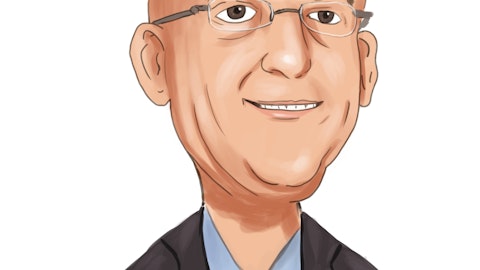Brett Monia : And Michael, we — there’s no plans to change our — there’s no changes to our plans for when the study will complete based on any new emerging data that has come out recently. We love our trial design. There are several factors that will impact when we read the study out. The first, of course, was to complete enrollment. We’ve now achieved that, and we’ve achieved it very successfully. We have the demographics in the study that we intended to have for — to actually have the greatest data set when the study reads out. We’ll also be looking at changing competitive landscape, new data as it emerges that could potentially affect the time we read the study out. We don’t think the Bridge trial data is going to impact that, but there may be other data that comes out.
And thirdly, our blinded event rates will be very important for us to continue to monitor as we decide when it’s beast, but there’s no change in the — currently, there’s no change in the timing of when that study is — our CARDIO-TTRansform study is due to read out.
Onaiza Cadoret: Let me just address one other question, which was on the payer reimbursement that I missed. So just to make sure that we’ve done a fair amount of testing with payers on the trial design. And again, if we show the cardiovascular risk reduction on top of tafamidis, there is clinical meaningfulness in that for physicians, and they are not going to be kind of standing in the way in terms of reimbursing a combo product here. Again, the data will bear out, and they’re very favorable in making sure these patients who are highly at risk, it’s a terminal disease or getting the best medication and care possible. So we’re really pleased to see them thinking about the disease and the patients is way and thinking about the landscape of reimbursement as either mono or combo in the space.
Operator: The next question comes from Yanan Zhu with Wells Fargo.
Yanan Zhu : I was wondering if you could share your thoughts on some recent development in Angelman syndrome field where Roche decided not to move their ASO program into the next stage of clinical development. And wondering if you could share any update from your Angelman syndrome clinical study that is ongoing. And any thoughts around the programs or the product candidates, efficacy and safety profile. And also, if you could also talk about for ATXN2 program, and its ongoing study, that will be great. I think the data are expected around the same time as the Angelman syndrome program.
Brett Monia : Sure. Thanks for the question. So the Angelman’s program — the Ionis Biogen Angelman program is going very well. We’re operationalizing the Phase 1/2 study, and we’re continuing to enroll patients in this study. We are — with Biogen are planning to have data around midyear next year from the Angelman’s program. And as I said, it’s going very well so far. We haven’t disclosed our — we really don’t have any insights into the reasoning behind why Roche ended their study. I think obviously, I’ve said that it wasn’t a safety issue. They said they didn’t meet their minimum target product profile or minimum criteria. I assume on efficacy. We really don’t have and shouldn’t — we’re not disclosing anything we may think on this.




